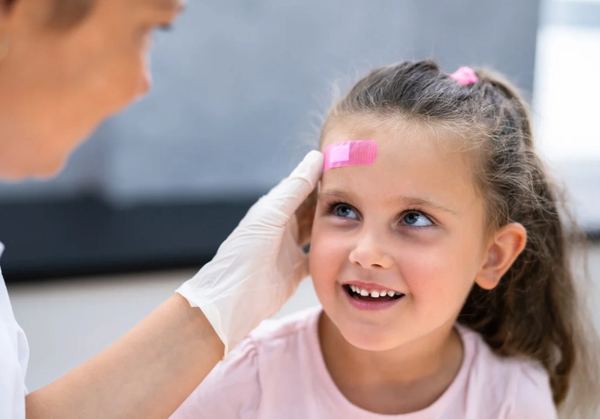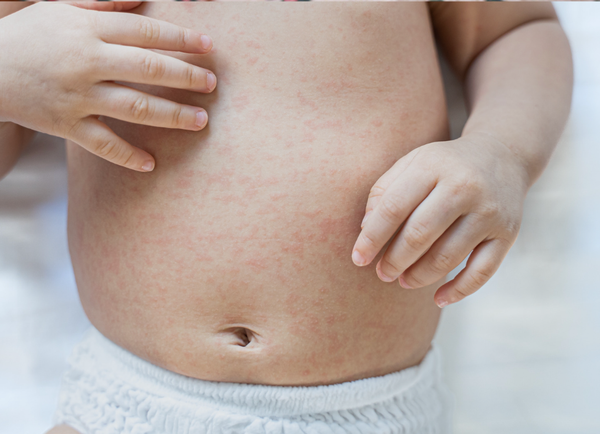GP for children
In our clinics, you and your child can come to doctors who enjoy providing health care to the little ones. We can help children of all ages.
- Child friendly experienced doctors
- Same-day appointments
- Fixed price 695,-*

Quick help when the little ones need it
Dr. Dropin offers a safe and accessible general practitioner service for children.
We at Dr. Dropin know that children's health is important, and that as a parent you want quick and good help when the child is ill or needs an examination. That is why we have assembled a team of experienced general practitioners who have extra interest and expertise in children's health.
Our general practitioner services for children is not a specialist service. We offer safe and effective general medical consultations for children, and will, if necessary, refer the child on to a specialist.

What can our doctors help your child with?
Our doctors can help children of all ages with a wide range of common childhood illnesses and health concerns, including:
- Colds and flu
- Ear infections
- Rashes and skin problems
- Allergies
- Fever and other infections

When should you call an emergency room or 113?
In some situations, it will be better to go to the emergency room or call 113. Especially if your child is in acute danger.
Read more
Meet one of our doctors
Dr. Victoria Nguyen works as a physician at Dr.Dropin, and has several years of experience in general medicine for both children and adults, as well as acute psychiatry. She focuses on ensuring that children have a positive experience when they visit the doctor. She always greets them with a smile and is dedicated to listening to the children.
Dr. Nguyen offers consultations in Norwegian and English.
Book appointment
Injuries and cuts in children?
Our experienced doctors help children of all ages with wound care and assessment of cuts. We stitch up minor cuts, but for deep cuts, cuts to the face, or wounds with signs of infection, the emergency room should be consulted.
For children under 2 years of age, or children who need extra support during treatment (for example, if the child needs to be held firmly), the emergency room may be a better option. They have additional staff who can assist the doctor in such situations. If in doubt, contact us or the emergency room for advice.
Read more and book an appointment for minor surgery here
Frequently asked questions
What can Dr.Dropin help me with?
We can help you with most things a GP or emergency room can.
In case of emergency, or life threatening injuries, please call 113
What can Dr.Dropin help me with?
We can help you with most things a GP or emergency room can.
In case of emergency, or life threatening injuries, please call 113
What happens if I miss my appointment?
If you realize that you’re not going to make your appointment, you can easily cancel it through the link you received on SMS – within 24 hours.
You can then book a new appointment, without any extra costs.
What happens if I miss my appointment?
If you realize that you’re not going to make your appointment, you can easily cancel it through the link you received on SMS – within 24 hours.
You can then book a new appointment, without any extra costs.
Do you upload information from the appointment to my medical record?
If you want your regular doctor to be informed about the topic and content of your appointment with Dr.Dropin, the doctor who treated you will send this information to your regular doctor.
Do you upload information from the appointment to my medical record?
If you want your regular doctor to be informed about the topic and content of your appointment with Dr.Dropin, the doctor who treated you will send this information to your regular doctor.
How do you process my personal health data?
All personal data are processed according to strict Norwegian privacy regulations.
In short, only relevant personal health data is stored, in case they are needed for further treatment. All other information is automatically deleted after the consultation.
How do you process my personal health data?
All personal data are processed according to strict Norwegian privacy regulations.
In short, only relevant personal health data is stored, in case they are needed for further treatment. All other information is automatically deleted after the consultation.
Can I change or cancel my appointment?
Cancellations and changes must be made no later than 24 hours before the appointment begins to avoid being invoiced in full.
Can I change or cancel my appointment?
Cancellations and changes must be made no later than 24 hours before the appointment begins to avoid being invoiced in full.
Where can I find Dr. Dropin General Practitioner
You can see an overview of our clinics here
We have general practitioners with appointments on the same day in Oslo, Sandvika, Bergen, Trondheim and Stavanger. We are available globally on video.
Where can I find Dr. Dropin General Practitioner
You can see an overview of our clinics here
We have general practitioners with appointments on the same day in Oslo, Sandvika, Bergen, Trondheim and Stavanger. We are available globally on video.
Can I take tests with Dr. Dropin?
Yes, we carry out various types of tests, including blood tests, urine tests, tissue tests and cervical smears. The general practitioners have the same type of tests as you find in the public sector and as long as they are medically indicated, they are covered by Helfo in the same way as the public sector. You pay only for the consultation. You can read more about samples here.
Can I take tests with Dr. Dropin?
Yes, we carry out various types of tests, including blood tests, urine tests, tissue tests and cervical smears. The general practitioners have the same type of tests as you find in the public sector and as long as they are medically indicated, they are covered by Helfo in the same way as the public sector. You pay only for the consultation. You can read more about samples here.
Can I use my insurance with Dr. Dropin?
Yes, Dr.Dropin has an agreement with the vast majority of insurance companies in Norway. You can read more about our insurance contracts here.
Can I use my insurance with Dr. Dropin?
Yes, Dr.Dropin has an agreement with the vast majority of insurance companies in Norway. You can read more about our insurance contracts here.
Is Dr.Dropin open on weekends and public holidays?
Opening hours vary from clinic to clinic. You will find updated opening times on the website and in the app. We will publish the opening hours well in advance of weekends and public holidays.
Our video service is open to everyone at 08-22, 365 days a year.
See our availability here.
Is Dr.Dropin open on weekends and public holidays?
Opening hours vary from clinic to clinic. You will find updated opening times on the website and in the app. We will publish the opening hours well in advance of weekends and public holidays.
Our video service is open to everyone at 08-22, 365 days a year.
See our availability here.
How to find a good public GP?
We recommend using the GP list on helsenorge.no to find a public GP who has available capacity. You can also consider Dr.Dropin as a supplement to your GP for quick access to health care.
Book GP here.
How to find a good public GP?
We recommend using the GP list on helsenorge.no to find a public GP who has available capacity. You can also consider Dr.Dropin as a supplement to your GP for quick access to health care.
Book GP here.
When should I see a doctor?
You should see a doctor if you experience persistent or disturbing symptoms, have acute complaints or need advice about health and illness.
Find available appointment here.
When should I see a doctor?
You should see a doctor if you experience persistent or disturbing symptoms, have acute complaints or need advice about health and illness.
Find available appointment here.
What is the difference between a general practitioner and a specialist?
https://booking.drdropin.no/A general practitioner is your first point of contact for health problems and can treat most common illnesses. A specialist has specialist expertise in a specific medical area and treats more complex conditions.
See available appointments with general practitioners, dermatologists and gynecologists here.
What is the difference between a general practitioner and a specialist?
https://booking.drdropin.no/A general practitioner is your first point of contact for health problems and can treat most common illnesses. A specialist has specialist expertise in a specific medical area and treats more complex conditions.
See available appointments with general practitioners, dermatologists and gynecologists here.
Which vaccines do I need as an adult?
Adults should consider vaccines against, among other things, diphtheria, tetanus, whooping cough, polio, influenza, pneumococcal disease and HPV. Contact Dr. Dropin for advice on which vaccines are relevant for you.
If you know which vaccines you need, you can easily get a prescription via the self-service form here.
Which vaccines do I need as an adult?
Adults should consider vaccines against, among other things, diphtheria, tetanus, whooping cough, polio, influenza, pneumococcal disease and HPV. Contact Dr. Dropin for advice on which vaccines are relevant for you.
If you know which vaccines you need, you can easily get a prescription via the self-service form here.
Does Dr. Dropin offer home visits?
Dr. Dropin does not currently offer home visits, but we have several clinics centrally located and offer video consultations as an alternative.
See our availability here.
Does Dr. Dropin offer home visits?
Dr. Dropin does not currently offer home visits, but we have several clinics centrally located and offer video consultations as an alternative.
See our availability here.
What do I do if I do not understand the doctor's advice?
Don't be afraid to ask questions if you don't understand something. You can also ask the doctor to explain in a different way or write down important information.
What do I do if I do not understand the doctor's advice?
Don't be afraid to ask questions if you don't understand something. You can also ask the doctor to explain in a different way or write down important information.
How do I know if my child's rash could be a sign of a serious illness?
If the child is in bad shape, has a fever, cries, expresses pain or discomfort, does not want to eat or drink anything in particular, is lethargic - then you should contact a doctor for a quick assessment
How do I know if my child's rash could be a sign of a serious illness?
If the child is in bad shape, has a fever, cries, expresses pain or discomfort, does not want to eat or drink anything in particular, is lethargic - then you should contact a doctor for a quick assessment
I think my child has chicken pox, what should I do?
If there is an outbreak of chicken pox in the nursery and you are sure that your child has been infected, all you have to do is keep the child at home until all the sores have dried up.
If the child seems to be in bad shape, has a high fever, etc., you should contact a doctor for an assessment
If you are in doubt as to whether it is chicken pox or not, it might also be good to have an examination by a doctor, so you will know for another time whether the child has had this or not.
I think my child has chicken pox, what should I do?
If there is an outbreak of chicken pox in the nursery and you are sure that your child has been infected, all you have to do is keep the child at home until all the sores have dried up.
If the child seems to be in bad shape, has a high fever, etc., you should contact a doctor for an assessment
If you are in doubt as to whether it is chicken pox or not, it might also be good to have an examination by a doctor, so you will know for another time whether the child has had this or not.
Is atopic eczema hereditary?
Heredity plays a significant role in the development of atopic eczema, yes, and if one of the parents has had this, there is a higher risk of their children also developing it.
Is atopic eczema hereditary?
Heredity plays a significant role in the development of atopic eczema, yes, and if one of the parents has had this, there is a higher risk of their children also developing it.
My child has a rash, can I send him/her to kindergarten for it?
Some types of rash can be contagious, so it is always a good idea to get an assessment from a doctor if you are in doubt.
My child has a rash, can I send him/her to kindergarten for it?
Some types of rash can be contagious, so it is always a good idea to get an assessment from a doctor if you are in doubt.
What is a rash?
Rashes are changes in the skin's colour, texture or appearance, and may be red, itchy, oozing or raised.
What is a rash?
Rashes are changes in the skin's colour, texture or appearance, and may be red, itchy, oozing or raised.
What are the common causes of rashes in children in Norway?
Viral infections (measles, rubella, chicken pox), bacterial infections (scarlet fever, chicken pox), allergic reactions (food allergy, eczema), heat rash, nappy rash and insect bites.
What are the common causes of rashes in children in Norway?
Viral infections (measles, rubella, chicken pox), bacterial infections (scarlet fever, chicken pox), allergic reactions (food allergy, eczema), heat rash, nappy rash and insect bites.
What do different rashes look like?
Viral rashes often start on the body and spread, while bacterial rashes are often red and runny. Allergic reactions cause an itchy, red rash, and eczema is dry and itchy. Heat rashes are small, red dots, and insect bites are red and swollen.
What do different rashes look like?
Viral rashes often start on the body and spread, while bacterial rashes are often red and runny. Allergic reactions cause an itchy, red rash, and eczema is dry and itchy. Heat rashes are small, red dots, and insect bites are red and swollen.
When should I contact a doctor with a rash?
Contact a doctor immediately if you have rapid breathing, lethargy, high fever, a rash that does not go away when you press on it, a rash in the mouth/eyes, severe pain or swelling in the face. Contact a doctor within a short time in case of widespread rash, worsening, fever, vomiting, diarrhea or uncertainty about the cause.
When should I contact a doctor with a rash?
Contact a doctor immediately if you have rapid breathing, lethargy, high fever, a rash that does not go away when you press on it, a rash in the mouth/eyes, severe pain or swelling in the face. Contact a doctor within a short time in case of widespread rash, worsening, fever, vomiting, diarrhea or uncertainty about the cause.
Can I use Dr.Dropin video doctor for rashes?
Yes, a video doctor can give advice on milder rashes. If a physical examination is required, you will be referred further.
Can I use Dr.Dropin video doctor for rashes?
Yes, a video doctor can give advice on milder rashes. If a physical examination is required, you will be referred further.
How to treat rash?
Treatment depends on the cause. Cooling baths, moisturizers and antipruritic agents can relieve symptoms. Antibiotics or allergy medicine may be necessary in some cases.
How to treat rash?
Treatment depends on the cause. Cooling baths, moisturizers and antipruritic agents can relieve symptoms. Antibiotics or allergy medicine may be necessary in some cases.
How to prevent rashes?
Good hygiene, avoid overheating, use sunscreen and bug spray, and follow the vaccination programme.
How to prevent rashes?
Good hygiene, avoid overheating, use sunscreen and bug spray, and follow the vaccination programme.
What is chicken pox?
Chickenpox is a highly contagious viral disease that causes an itchy rash with red dots and blisters. The rash often starts on the body and spreads to the face, arms and legs. The child may also have a fever, headache and be lethargic.
What is chicken pox?
Chickenpox is a highly contagious viral disease that causes an itchy rash with red dots and blisters. The rash often starts on the body and spreads to the face, arms and legs. The child may also have a fever, headache and be lethargic.
What is hand, foot and mouth disease?
Hand, foot and mouth disease is a viral infection that causes blisters in the mouth, hands and feet. The child may also have a fever and a sore throat. The disease is most common in children under 5 years of age.
What is hand, foot and mouth disease?
Hand, foot and mouth disease is a viral infection that causes blisters in the mouth, hands and feet. The child may also have a fever and a sore throat. The disease is most common in children under 5 years of age.
What is three-day fever (exanthema subitum)?
Three-day fever is a viral infection that causes a high fever for 3-4 days, followed by a pale pink rash on the body when the fever subsides. The disease is most common in children under 2 years of age.
What is three-day fever (exanthema subitum)?
Three-day fever is a viral infection that causes a high fever for 3-4 days, followed by a pale pink rash on the body when the fever subsides. The disease is most common in children under 2 years of age.
What is fifth childhood disease (erythema infectiosum)?
Fifth childhood disease is a viral infection that causes a red rash on the cheeks ("slapped cheek"), followed by a lace-like rash on the body. The disease is most common in school-aged children.
What is fifth childhood disease (erythema infectiosum)?
Fifth childhood disease is a viral infection that causes a red rash on the cheeks ("slapped cheek"), followed by a lace-like rash on the body. The disease is most common in school-aged children.
What is scarlet fever?
Scarlet fever is a bacterial infection that causes a red, sandpaper-like rash on the body, often accompanied by fever, sore throat and "raspberry tongue".
What is scarlet fever?
Scarlet fever is a bacterial infection that causes a red, sandpaper-like rash on the body, often accompanied by fever, sore throat and "raspberry tongue".
What is impetigo (chicken pox)?
Impetigo is a skin infection caused by bacteria. It causes oozing sores that crack and form yellow crusts. Impetigo is contagious and most common in children.
What is impetigo (chicken pox)?
Impetigo is a skin infection caused by bacteria. It causes oozing sores that crack and form yellow crusts. Impetigo is contagious and most common in children.
What is atopic eczema?
Atopic eczema is a chronic skin disease that causes dry, itchy and inflamed skin. It is most common in children and can be hereditary.
What is atopic eczema?
Atopic eczema is a chronic skin disease that causes dry, itchy and inflamed skin. It is most common in children and can be hereditary.
How can I know which disease my child has?
It is important to contact a doctor to get the correct diagnosis and treatment of rashes in children. The doctor will assess the rash, the child's symptoms and any history of infection to find the cause.
How can I know which disease my child has?
It is important to contact a doctor to get the correct diagnosis and treatment of rashes in children. The doctor will assess the rash, the child's symptoms and any history of infection to find the cause.
Can I treat childhood illnesses at home?
Most viral infections that cause rashes in children go away on their own. You can relieve the symptoms with fever-reducing, pain-relieving and anti-itching agents. In the case of bacterial infections, antibiotics may be necessary.
If you are unsure or in doubt, contact a doctor.
Can I treat childhood illnesses at home?
Most viral infections that cause rashes in children go away on their own. You can relieve the symptoms with fever-reducing, pain-relieving and anti-itching agents. In the case of bacterial infections, antibiotics may be necessary.
If you are unsure or in doubt, contact a doctor.
How can I relieve my child's discomfort from a rash?
You can ease the discomfort of a rash by:
Give the child fever-reducing and pain-relieving medicine (on advice from a doctor or pharmacist).
Cool the skin with cold compresses or a lukewarm bath.
Use anti-itch cream or lotion (on advice from a doctor or pharmacist).
Dress the child in soft, loose-fitting clothes.
Make sure the child gets enough fluids.
How can I relieve my child's discomfort from a rash?
You can ease the discomfort of a rash by:
Give the child fever-reducing and pain-relieving medicine (on advice from a doctor or pharmacist).
Cool the skin with cold compresses or a lukewarm bath.
Use anti-itch cream or lotion (on advice from a doctor or pharmacist).
Dress the child in soft, loose-fitting clothes.
Make sure the child gets enough fluids.
When can my child return to daycare/school after a rash?
When the child can return to kindergarten or school depends on the illness and the child's general condition. In the case of infectious diseases, it is important to follow the doctor's advice to avoid infecting others.
When can my child return to daycare/school after a rash?
When the child can return to kindergarten or school depends on the illness and the child's general condition. In the case of infectious diseases, it is important to follow the doctor's advice to avoid infecting others.
What is an ear infection and what causes it?
Otitis media, also known as otitis media, is an inflammation of the middle ear, usually caused by an infection. The infection can be bacterial or viral, and it can occur as a result of a cold or other respiratory infection.
What is an ear infection and what causes it?
Otitis media, also known as otitis media, is an inflammation of the middle ear, usually caused by an infection. The infection can be bacterial or viral, and it can occur as a result of a cold or other respiratory infection.
What are the symptoms of an ear infection?
The symptoms of an ear infection can include ear pain, a feeling of fullness in the ear, impaired hearing, fever, and in some cases fluid leakage from the ear.
What are the symptoms of an ear infection?
The symptoms of an ear infection can include ear pain, a feeling of fullness in the ear, impaired hearing, fever, and in some cases fluid leakage from the ear.
How is ear infection diagnosed?
Ear infections can be diagnosed by examining the ear with an otoscope to look for signs of inflammation and infection. The doctor may also take a sample of the fluid from the ear to determine whether the infection is bacterial or viral.
How is ear infection diagnosed?
Ear infections can be diagnosed by examining the ear with an otoscope to look for signs of inflammation and infection. The doctor may also take a sample of the fluid from the ear to determine whether the infection is bacterial or viral.
How is an ear infection treated?
The treatment of otitis media may include pain relievers such as ibuprofen or acetaminophen to relieve pain and fever, as well as prescription ear drops or antibiotics if the infection is bacterial.
How is an ear infection treated?
The treatment of otitis media may include pain relievers such as ibuprofen or acetaminophen to relieve pain and fever, as well as prescription ear drops or antibiotics if the infection is bacterial.
How can I relieve ear infection pain at home?
Pain from an ear infection can be relieved at home by applying warm compresses to the affected ear, taking pain medication as prescribed by the doctor, and by avoiding lying flat on the ear.
How can I relieve ear infection pain at home?
Pain from an ear infection can be relieved at home by applying warm compresses to the affected ear, taking pain medication as prescribed by the doctor, and by avoiding lying flat on the ear.
Are there any special precautions I should take if I have an ear infection?
Yes, it may be a good idea to avoid submerging your head under water while bathing or swimming, and to contact a doctor if symptoms do not improve within a few days or get worse.
Are there any special precautions I should take if I have an ear infection?
Yes, it may be a good idea to avoid submerging your head under water while bathing or swimming, and to contact a doctor if symptoms do not improve within a few days or get worse.
What is an ear canal infection and what causes it?
An ear canal infection, also known as otitis externa, is an inflammation of the ear canal caused by bacteria or fungi. Common causes include moisture in the ear, damage to the ear canal, or the use of foreign objects in the ear.
What is an ear canal infection and what causes it?
An ear canal infection, also known as otitis externa, is an inflammation of the ear canal caused by bacteria or fungi. Common causes include moisture in the ear, damage to the ear canal, or the use of foreign objects in the ear.
What are the symptoms of ear canal infection?
The symptoms of an ear canal infection can include ear pain, itching in the ear, redness and swelling of the ear canal, hearing loss, and in some cases fluid drainage from the ear.
What are the symptoms of ear canal infection?
The symptoms of an ear canal infection can include ear pain, itching in the ear, redness and swelling of the ear canal, hearing loss, and in some cases fluid drainage from the ear.
How is ear canal infection diagnosed?
Ear canal infection can usually be diagnosed by a physical examination of the ear by a doctor. In some cases, a sample of earwax or fluid from the ear may be needed to confirm the diagnosis.
How is ear canal infection diagnosed?
Ear canal infection can usually be diagnosed by a physical examination of the ear by a doctor. In some cases, a sample of earwax or fluid from the ear may be needed to confirm the diagnosis.
How is ear canal infection treated?
The treatment of ear canal infection may include prescription ear drops containing antibiotics or antifungals, pain medications to relieve pain and inflammation, and in some cases oral antibiotics.
How is ear canal infection treated?
The treatment of ear canal infection may include prescription ear drops containing antibiotics or antifungals, pain medications to relieve pain and inflammation, and in some cases oral antibiotics.
How can I relieve ear canal infection pain at home?
Pain from an ear canal infection can be relieved at home by applying warm compresses to the affected ear, taking pain medication as prescribed by the doctor, and by avoiding manipulating or inserting anything into the ear.
How can I relieve ear canal infection pain at home?
Pain from an ear canal infection can be relieved at home by applying warm compresses to the affected ear, taking pain medication as prescribed by the doctor, and by avoiding manipulating or inserting anything into the ear.
Can ear canal infection be prevented?
Prevention of ear canal infection includes avoiding exposing the ears to excess moisture, avoiding swimming in contaminated water, and avoiding manipulating the ears unnecessarily.
Can ear canal infection be prevented?
Prevention of ear canal infection includes avoiding exposing the ears to excess moisture, avoiding swimming in contaminated water, and avoiding manipulating the ears unnecessarily.
What is conjunctivitis and what causes it?
Conjunctivitis is an inflammation of the outer layer of the eye and the inside of the eyelid. It can be caused by bacteria, viruses, allergens or irritants.
What is conjunctivitis and what causes it?
Conjunctivitis is an inflammation of the outer layer of the eye and the inside of the eyelid. It can be caused by bacteria, viruses, allergens or irritants.
What is the difference between bacterial, viral and allergic conjunctivitis?
Bacterial conjunctivitis is caused by bacteria, viral conjunctivitis by viruses, while allergic conjunctivitis occurs as a reaction to allergens.
What is the difference between bacterial, viral and allergic conjunctivitis?
Bacterial conjunctivitis is caused by bacteria, viral conjunctivitis by viruses, while allergic conjunctivitis occurs as a reaction to allergens.
What are the symptoms of conjunctivitis?
Symptoms include red eyes, itching, burning, tearing, pus formation, and sensation of sand or foreign body in the eye.
What are the symptoms of conjunctivitis?
Symptoms include red eyes, itching, burning, tearing, pus formation, and sensation of sand or foreign body in the eye.
How is conjunctivitis treated?
Treatment depends on the cause, but may include prescription eye drops or ointments, antihistamines for allergic conjunctivitis, and good eye hygiene.
How is conjunctivitis treated?
Treatment depends on the cause, but may include prescription eye drops or ointments, antihistamines for allergic conjunctivitis, and good eye hygiene.
How long does conjunctivitis last?
The duration of conjunctivitis depends on the cause. Viral conjunctivitis can last for 1-2 weeks, while bacterial conjunctivitis may require antibiotic treatment and last less with the right treatment.
How long does conjunctivitis last?
The duration of conjunctivitis depends on the cause. Viral conjunctivitis can last for 1-2 weeks, while bacterial conjunctivitis may require antibiotic treatment and last less with the right treatment.
Can conjunctivitis come back after treatment?
Yes, conjunctivitis can come back if you do not follow your doctor's instructions for treatment or if you are exposed to the same infectious factors again.
Can conjunctivitis come back after treatment?
Yes, conjunctivitis can come back if you do not follow your doctor's instructions for treatment or if you are exposed to the same infectious factors again.
What are the most common complications associated with conjunctivitis?
Common complications include corneal infection, eyelid inflammation, and in rare cases, vision loss.
What are the most common complications associated with conjunctivitis?
Common complications include corneal infection, eyelid inflammation, and in rare cases, vision loss.
Can I wear contact lenses if I have conjunctivitis?
It is best to avoid wearing contact lenses while you have conjunctivitis, as this can worsen the condition and increase the risk of infection.
Can I wear contact lenses if I have conjunctivitis?
It is best to avoid wearing contact lenses while you have conjunctivitis, as this can worsen the condition and increase the risk of infection.
